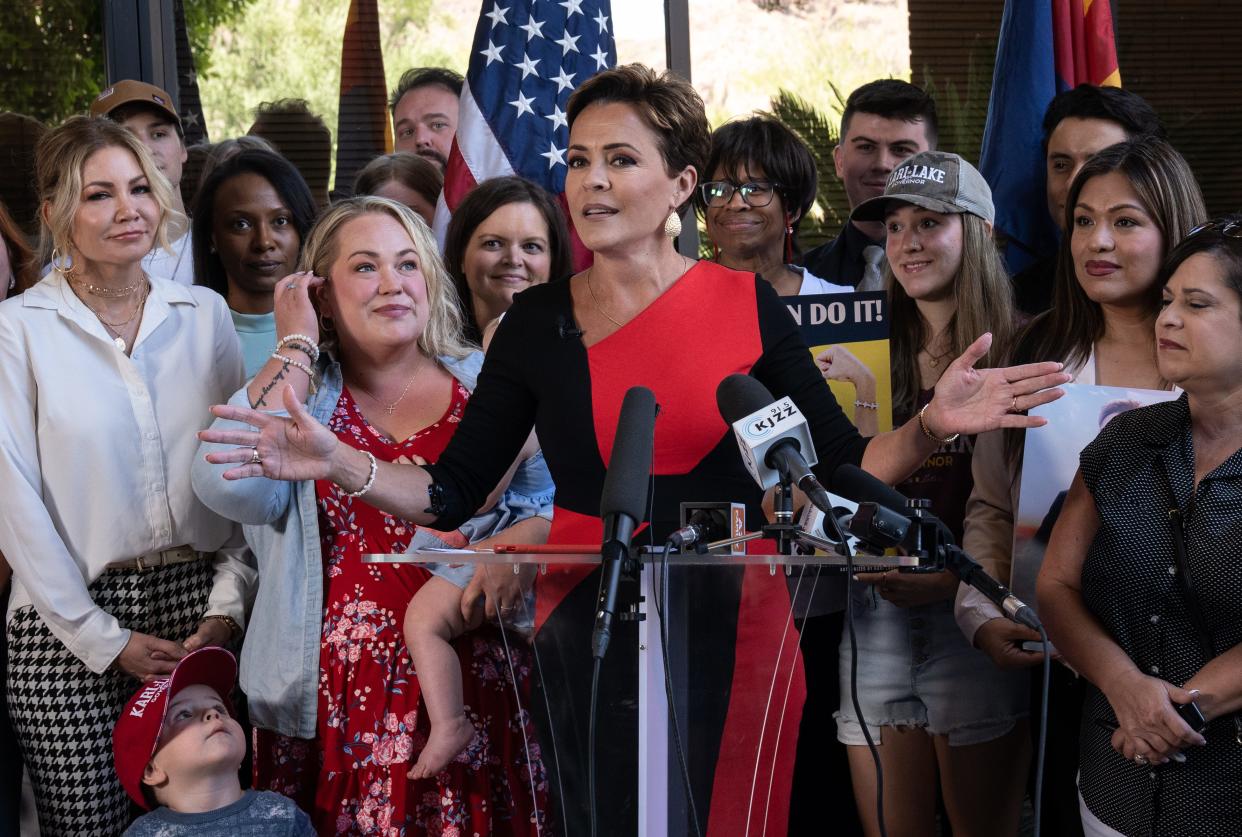Kari Lake's election challenge appeal was moved from Phoenix to Tucson. Here's why

- Oops!Something went wrong.Please try again later.
- Oops!Something went wrong.Please try again later.
- Oops!Something went wrong.Please try again later.
Former GOP candidate for governor Kari Lake's appeal of her failed election challenge will move from a Phoenix court to Tucson as part of a relatively new effort to balance caseloads between the state's two appeals divisions.
Lake, the former television news anchor and Trump ally, has continued contesting her 17,117-vote loss in November to Democratic Gov. Katie Hobbs. In two trials and a prior appeal up to the Arizona Supreme Court, Lake has not proven she won the race, and each of those courts have affirmed Hobbs' victory.
Here's what's next for Lake's case, and why it will move forward in Pima County and not in Maricopa County.
2022 law lets court decide 'best use of judicial resources'
In June 2022, Republican Gov. Doug Ducey signed into law House Bill 2859, which added three judges to each of the state's two appeals courts. One court with nine judges is in Tucson, and it handles cases from seven southern Arizona counties. One with 19 judges is in Phoenix, and handles cases from Arizona's eight northern counties, including Maricopa County, the most populous.
As a swan song to his eight years in governor, Ducey appointed judges — who can serve for decades — to those newly created jobs on the bench.
But the bill that allowed him to do so had numerous other provisions, including letting court staff move cases between the two courts to "equalize caseloads and for the best use of judicial resources."
How the court implemented the law
An initial agreement between the two court divisions, dated in January, shows that at least at the start only certain types of cases would move from Phoenix to Tucson, which in recent years has handled roughly a quarter of the number of cases Phoenix does. Those include civil matters like Lake's.
Using a calculation based on prior caseloads and factoring in the new judges, the agreement says the Phoenix court should hear two-thirds of all cases filed while the Tucson counterpart should hear one-third.
As a result, court clerks transfer every seventh civil appeal filed in Phoenix to Tucson. Lake's was a lucky number seven.
So far this year, 80 cases have moved to Tucson, according to Amy Wood, clerk of the Phoenix appeals court, which is formally known as Division 1. Tucson is Division II. The case sharing agreement and its effect on Lake's case was first reported by Arizona's Law, a legal blog that has chronicled Lake's and other high-profile matters in the Grand Canyon State.
What Lake is appealing in her election case
The former first-time candidate is asking the appeals court to reconsider a May ruling dismissing her claims that Maricopa County election workers didn't follow state law when they verified voter signatures on ballot return envelopes matched what was in the voter's record. Maricopa County Superior Court Judge Peter Thompson found that "a comparison between voter records and signatures was conducted in every instance Plaintiff asked the Court to evaluate."
She filed her notice of appeal — the initial step in an appeal — May 31. The appeal has chugged along as Lake flirts with a run for U.S. Senate in Arizona next year, injecting frequent jabs at Democratic candidate Ruben Gallego, a congressman from Phoenix, into her mix of grievances against the media and liberal causes and candidates.
What Lake is saying about her case transfer
Lake's campaign for governor often dealt in misinformation related to the 2020 election and other issues, with her false claims Donald Trump won a second term a prominent campaign feature. About the transfer of her case, Lake alleged on social media the case was moved to "the most Marxist part of the state."
"We see what's happening here," Lake wrote, directing readers to her fundraising website. Her lawyer, Kurt Olsen, and two spokespeople did not respond to emails Tuesday seeking comment.
Who are the judges on the Tucson appellate court?
Of nine judges that sit on the Tucson court, seven were appointed by Ducey and two were appointed roughly two decades ago by Arizona's last Democratic governor, Janet Napolitano.
The three judges assigned to Lake's case are Presiding Judge Sean Brearcliffe and judges Peter Eckerstrom and Michael Kelly. Two are Ducey appointees: Brearcliffe was appointed in 2017 and Kelly was named to the court last year. Eckerstrom was a Napolitano appointee who has sat on the court since 2003.
How Lake's election case got to this point
Lake first filed her election challenge in December, and it's bounced back and forth between courts since then. Her legal team argued at trial last year that election officials' misconduct influenced the result, but a Maricopa County judge found the lawyers never offered clear and convincing evidence showing the election was rigged against her.
Lake appealed, and her lawyers continued making false claims in court, ultimately warranting a $2,000 penalty handed down by the Arizona Supreme Court. The state's highest court also disagreed with the legal justification used to dismiss one of Lake's claims, reopening the issue and leading to the second trial in May.
In that trial, Lake's lawyers argued that Maricopa County workers verified voter signatures on ballot return envelopes so quickly it didn't meet a standard set in law. Again, a Maricopa County judge, disagreed and affirmed Hobbs' win, writing that the law doesn't specify timeframes for signature reviews.
Reach reporter Stacey Barchenger at stacey.barchenger@arizonarepublic.com or 480-416-5669.
This article originally appeared on Arizona Republic: Why Kari Lake's election case will transfer from Phoenix to Tucson

